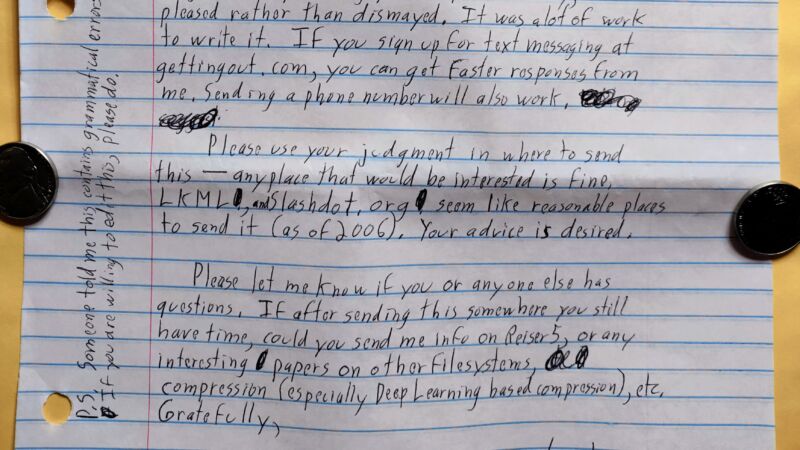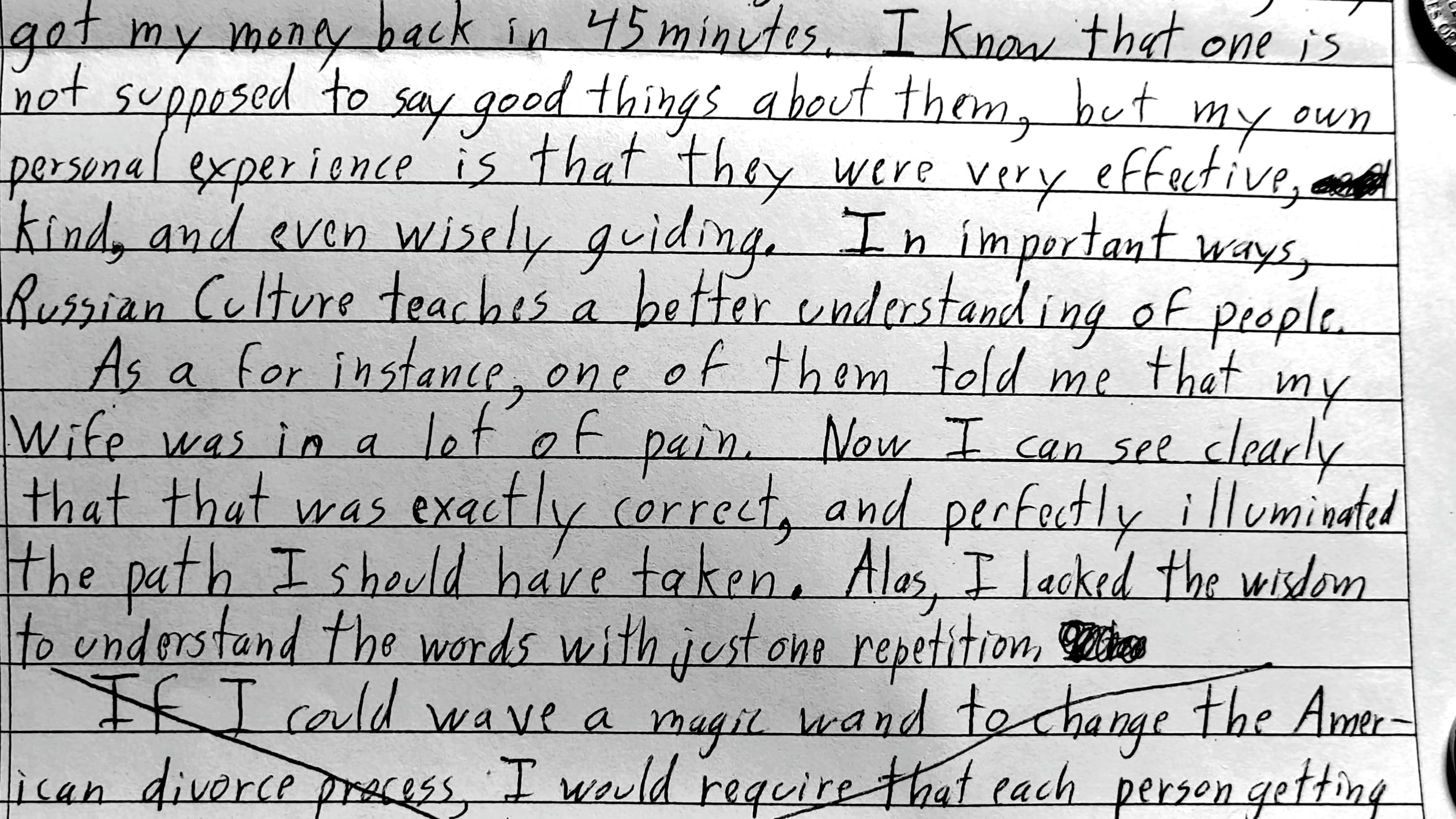“The man I am now would do things very differently,” Reiser says in long letter.

With the ReiserFS recently considered obsolete and slated for removal from the Linux kernel entirely, Fredrick R. Brennan, font designer and (now regretful) founder of 8chan, wrote to the filesystem’s creator, Hans Reiser, asking if he wanted to reply to the discussion on the Linux Kernel Mailing List (LKML).
Reiser, 59, serving a potential life sentence in a California prison for the 2006 murder of his estranged wife, Nina Reiser, wrote back with more than 6,500 words, which Brennan then forwarded to the LKML. It’s not often you see somebody apologize for killing their wife, explain their coding decisions around balanced trees versus extensible hashing, and suggest that elementary schools offer the same kinds of emotional intelligence curriculum that they’ve worked through in prison, in a software mailing list. It’s quite a document.
What follows is a relative summary of Reiser’s letter, dated November 26, 2023, which we first saw on the Phoronix blog, and which, by all appearances, is authentic (or would otherwise be an epic bit of minutely detailed fraud for no particular reason). It covers, broadly, why Reiser believes his system failed to gain mindshare among Linux users, beyond the most obvious reason. This leads Reiser to detail the technical possibilities, his interpersonal and leadership failings and development, some lingering regrets about dealings with SUSE and Oracle and the Linux community at large, and other topics, including modern Russian geopolitics.
“LKML and Slashdot.org seem like reasonable places to send it (as of 2006)”
In a cover letter, Reiser tells Brennan that he hopes he can use OCR to import his lengthy letter and asks him to use his best judgment in where to send his reply. He also asks, if he has time, Brennan might send him information on “Reiser5, or any interesting papers on other Filesystems, compression (especially Deep Learning based compression), etc.”Advertisement
Then Reiser addresses the kernel mailing list directly—very directly:
ReiserFS V3 was “our first filesystem, and in doing it we made mistakes, because we didn’t know what we were doing,” Reiser writes. He worked through “years of dark depression” to get V3 up to the performance speeds of ext2, but regrets how he celebrated that milestone. “The man I was then presented papers with benchmarks showing that ReiserFS was faster than ext2. The man I am now would stat his papers … crediting them for being faster than the filesystems of other operating systems, and thanking them for the years we used their filesystem to write ours.” It was “my first serious social mistake in the Linux community, and it was completely unnecessary.”
Reiser asks that a number of people who worked on ReiserFS be included in “one last release” of the README, and to “delete anything in there I might have said about why they were not credited.” He says prison has changed him in conflict resolution and with his “tendency to see people in extremes.”
Reiser extensively praises Mikhail Gilula, the “brightest mind in his generation of computer scientists,” for his work on ReiserFS from Russia and for his ideas on rewriting everything the field knew about data structures. With their ideas on filesystems and namespaces combined, it would be “the most important refactoring of code ever.” His analogy at the time, Reiser wrote, was Adam Smith’s ideas of how roads, waterways, and free trade affected civilization development; ReiserFS’ ideas could similarly change “the expressive power of the operating system.”
“I never got to that dream because of my crime”
Reiser writes that he understood the difficulty ahead in getting the Linux world to “shift paradigms” but lacked the understanding of how to “make friends and allies of people” who might initially have felt excluded. This is followed by a heady discussion of “balanced trees instead of extensible hashing,” Oracle’s history with implementing balanced trees, getting synchronicity just right, I/O schedulers, block size, seeks and rotational delays on magnetic hard drives, and tails. It leads up to a crucial decision in ReiserFS’ development, the hard non-compatible shift from V3 to Reiser 4.
Format changes, Reiser writes, are “unwanted by many for good reasons.” But “I just had to fix all these flaws, fix them and make a filesystem that was done right. It’s hard to explain why I had to do it, but I just couldn’t rest as long as the design was wrong and I knew it was wrong,” he writes.
SUSE didn’t want a format change, but Reiser, with hindsight, sees his pushback as “utterly inarticulate and unsociable.” The push for Reiser 4 in the Linux kernel was similar, “only worse.”
Reiser jumps back in time to note how the loss of Gilula to a job in the US, and then that firm’s continual hiring of his team, deeply affected his mentality. With the distance of time, Reiser writes that he understands they were simply making the best economic decision for themselves, but “then I felt so betrayed.” He could never pay people well, and they worked for “the guy with more dream than experience.” Even if he had gone further, Reiser writes, he was “callous and indifferent to their needs and dreams when I committed my crime, and victimized them financially and ruined their dreams that I had talked them into.”
“One of my great regrets is that I let go of Mikhail as a friend. I hope he is alive, and doing well.”

Russian culture, alienation, and then back to filesystems
The letter shifts abruptly to how Reiser frantically sought funding from DARPA for Reiser 4. Without making it clear, he suggests that the filesystem’s Russian ties hindered its federal chances, despite being at “a point of light in US-Russian relations” in the late 1990s and early 2000s. There’s a strange aside about the Russian mafia getting him back $300 he lost in a scam “in 45 minutes.” And a note that Russian culture “teaches a better understanding of people.” “As a for instance, one of them told me that my wife was in a lot of pain. Now I can see clearly that that was exactly correct,” he writes, without confirming if “one of them” was a Russian coworker or Russian mafia member.Advertisement
There is a section of Reiser’s letter, crossed out in an image file uploaded by Brennan, and so not included in the LKML text post, in which Reiser states that if he could “wave a magic wand to change the American divorce process,” he would require each person be asked: “Is it possible that your spouse is in a lot of pain, and could that explain their actions?” Such “inviting empathy,” Reiser writes, is something he uses frequently in conflict resolution and meditation.
Reiser goes on to say that while now “is not the time to try to be a light in US-Russian relations,” he hopes that there’s a time to find “friendship and love, between Russia and Ukraine and the US, and between my children and I.”
And then “Back to Reiser 4,” which Reiser says was far more adaptable to plugins and new features than others of the time. His team of four produced “beautiful code,” a filesystem “worthy of their talents.” But Reiser’s response to those in the kernel community doing similar work was “screwing the pooch in response” with arguments and benchmarks. It didn’t help that the team was “dropping 90,000 lines of code on them all at once, having worked on it in total social isolation for 5 years in Moscow.”
Reiser expounds on the conflict resolution he’s picked up in cognitive behavioral intervention classes in prison, and how that might have guided his Linux kernel interactions back then. Making people feel appreciated and asking for their ideas, rather than asking, “Why do I have to deal with these people who didn’t write as fast of a filesystem?” He notes that he believes elementary schools should have similar kinds of emotional guidance classes as he’s had access to in prison.
“Let their dreams escape from the harm I have done”
Reiser provides many examples of how he could have handled different code and code submission situations differently. He apologizes for situations in which he made people not feel “appreciated or included,” for failing his team members, and “alienating others in the Linux kernel community.”
Reiser thanks Edward Shishkin for his work on Reiser 5, though he notes he doesn’t know what is in it. He encourages people to “allow those who worked so hard to build a beautiful filesystem for the users to escape the effects of my reputation.”
Under a “Conclusion” sub-heading, Reiser is fairly succinct in summarizing a rather wide-ranging letter, minus the minutiae about filesystem architecture.
It both is and is not a response to Brennan’s initial prompt, asking how he felt about ReiserFS being slated for exclusion from the Linux kernel. There is, at the moment, no reply to the thread started by Brennan.




